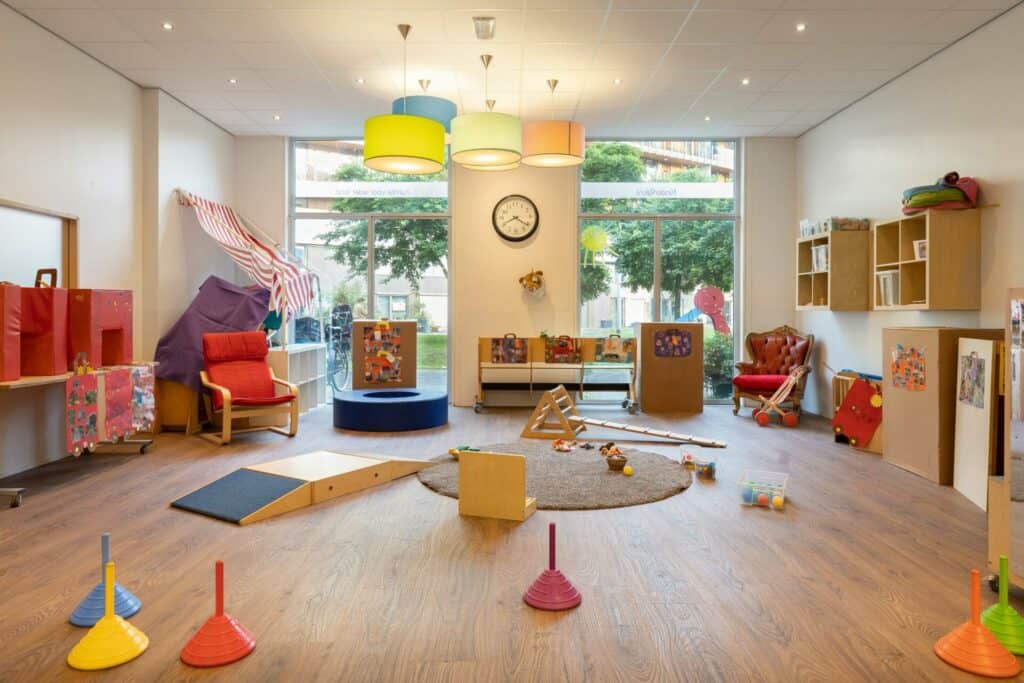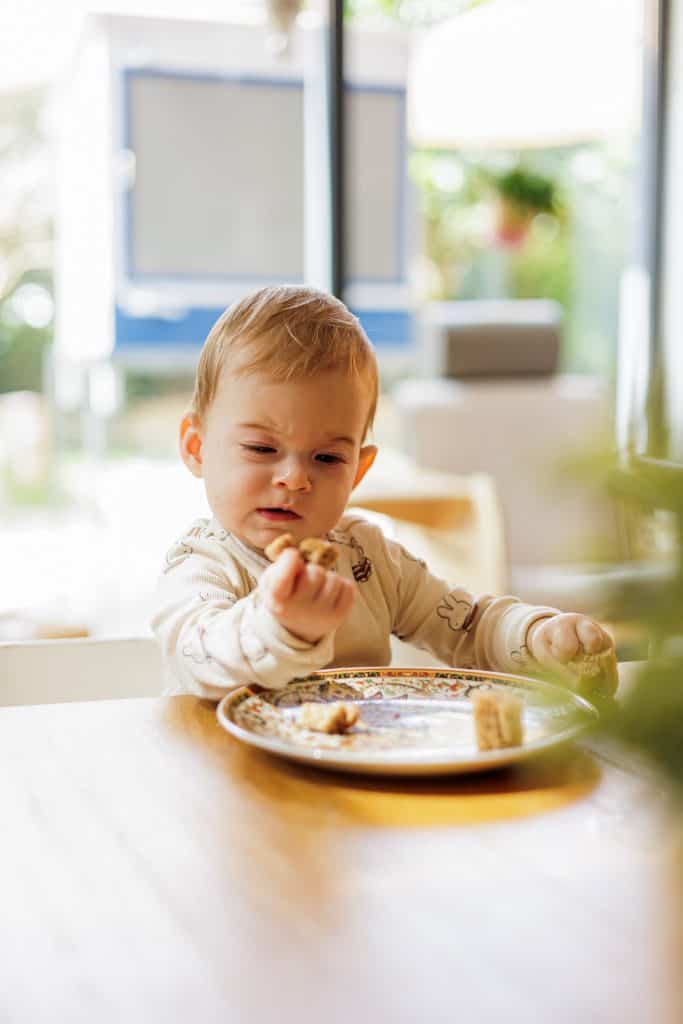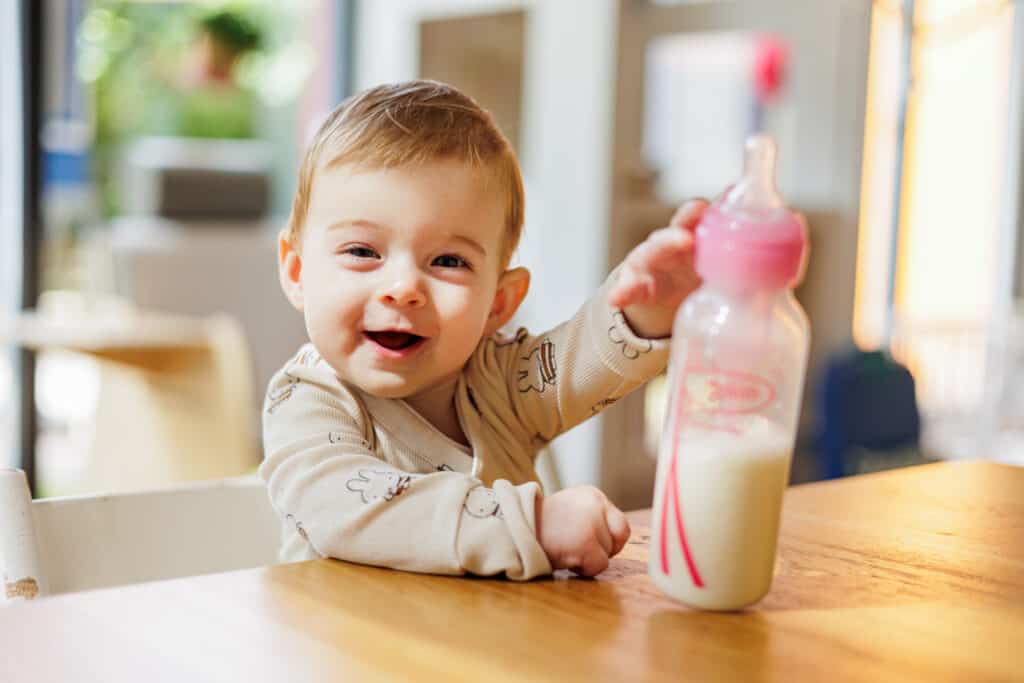Your child is 6 – 12 months old
The timeline below shows the key milestones in your child’s development during this age. We should like to tell you about the children’s experience in each developmental area and, of course, we also want to explain how we respond to this at KinderRijk.
Learn more about…

1. Motor skills
Motor skills are an essential aspect in the development in young children. A child needs motor skills in order to develop properly, because if you want to explore your surroundings, you need to be able to move, grab and hold things and move yourself.
“THE GROUP SPACE IS LAID OUT WITH ATTRACTIVE DISCOVERY MATERIALS IN DIFFERENT PLACES AND AT CHILD LEVEL.”

Exploratory material
At KinderRijk, we prefer to lay the children on their backs with toys appropriate to this developmental phase so that your child learns to roll and turn on his stomach from this position. Once a child starts creeping, he will then start practising crawling by pulling his legs up under his body. Usually, a child is able to sit independently only after he is able to crawl properly. The great advantage of this is that the baby’s back is strong enough and he is also able to get out of the sitting position on his own. We therefore monitor your baby’s development closely and, for example, put him in a high chair only after he is able to sit up properly on his own. We let babies play in a quiet place where it is safe with no romping about.
The group room is laid out with attractive discovery materials in different places and at child level. These materials are rearranged several times a day. This allows your baby to discover and experiment for himself what he can do with them.
Children who are learning to walk enjoy practising along the floor box. It gives them something to hold on to when trying out their first steps. Sometimes they don’t manage to sit up again, in which case we lend a hand. It is useful for babies to learn all these new skills at their own pace for their self-esteem and confidence.
Milestones
-
Pointing out objects
Your baby is getting better at learning to make gestures to make clear what he wants. He starts pointing out objects and the fine motor skills are improving.
-
Creeping
Babies who lay down on their tummy by themselves often move backwards first and only later on they will move forward. This is because they first push off with their hands, making them move backwards. Then they usually start to creep first: moving forward with their body against the floor.
-
Crawling
Creeping often turns into crawling: your baby notices it is easier when he raises his bottom and belly.
-
Sitting
From 8 months, a baby tries to sit up by itself. This way he can see more and has both hands free. Your baby’s back and neck are getting stronger now.
-
Pulling up
Your baby practices pulling up to stand up and back again. He keeps himself upright with the strength of his hands and arms. From pulling up to walking usually takes 3 to 4 months.
-
Standing alone
Your baby loves to stand on his bare feet. He is able to stand alone when he is about 10 or 11 months old. Some babies will then walk along a table edge or along the playpen, or even take a few steps by itself!


2. Language development
Babies are not yet able to speak fluent sentences, but they do ‘talk’. In fact, babies use their whole body to communicate with you. As language development progresses, your baby is increasingly easier to understand. Our educational staff therefore talk a great deal to babies and respond to their gestures.
Language and oral motor skills
Our staff are used to talking a great deal with the babies right from the start. We tell the babies what we are going to do and we involve the children in the nursing. This is important for their feeling of safety, and also for language development. We communicate with your baby in a calm and respectful way. By repeating words regularly, your child learns the rhythm and sound of our language. We have eye contact when we talk and call your baby by his name.
Babies love listening to songs and rhymes. ‘Clap your hands’, ‘These are my cheeks’ and peekaboo games also encourage language skills.
We aim to have children drinking from a regular cup from around 9 months of age. This is essential to language and speech development as it stimulates mouth muscles and motor skills. As we usually use transparent cups, your baby can see how much water or milk is left in the cup.
“WE AIM TO HAVE CHILDREN DRINK FROM A REGULAR CUP FROM AROUND 9 MONTHS OF AGE. THIS IS USEFUL FOR THE DEVELOPMENT OF THE MOUTH MUSCLES AND MOTOR SKILLS.”
Milestones
-
Gestures
When using simple words, your baby is already able to point at things. They also increasingly start to wave when they leave or hold up their arms to be lifted.
-
Mimicking
Your baby will start imitating sounds and facial expressions which he knows from his surroundings.
-
Babbling
Around 7-8 months, your baby enters the babbling phase and starts saying different sounds in succession, such as ‘dada’. Through your response, your child will learn that some sounds have to do with mummy or daddy. Incidentally, ‘mama’ is more difficult for many babies than ‘dada’ or ‘papa’.
-
First word
Your baby’s first real word is likely to happen between 10 and 12 months.

3. Cognitive development
Your child’s cognitive development includes learning, memorisation, problem solving and intelligence. Between 6 and 12 months, your child goes through major developments in these areas.
Your baby’s attention to the environment is increasing: his world is also literally expanding. Your baby now recognises that his own behaviour has an effect on the outside world. He starts acting more and more deliberately, provoking new reactions. For example, when mummy puts on her coat to leave… your baby will consciously raise his arms and cry.

Milestones
-
Purposeful
Your baby starts acting more purposefully. For example, he will remove the cap from the bottle because he knows he can only drink that way.
-
Triggering effects
Your baby becomes fascinated by cause and effect. When you come with a bib, your baby knows he is having a bottle. He discovers that different actions create a certain effect.
-
Object permanency
Your baby is developing the ability to keep an image in his memory without seeing it. He starts looking for a toy he has just thrown under the cupboard.
-
Combining
Your baby learns to combine. In a booklet, for example, he may look for a picture of an elephant he knows from a previous time.
Different materials
Children are naturally curious, which is why we provide different materials. Toys can be anything: empty butter tubs without sharp edges, which the baby can put something inside, cups, ladles, books, grab balls, pieces of different fabrics, all kinds of materials that the babies themselves can grasp and explore. It gives your child many insights. At our table, your baby can soon have his own spoon to stir with, just like he sees other children do.
Children increasingly come to realise that an object still exists even if it is out of sight. Hiding a toy under a hand or cloth is a suitable game. Your baby will pull the hand or cloth away and grab the toy.
Reading to babies is important to stimulate cognitive development. It is educational and fun and often also a moment of individual attention for your baby. Naming the pictures, turning the pages and feeling a book are all part of this, as well as repeat, repeat, repeat.
“AT OUR TABLE, YOUR BABY CAN SOON HAVE HIS OWN SPOON TO STIR WITH, JUST LIKE HE SEES OTHER CHILDREN DO.”


4. Personality development
Your baby has his own temperament straight from birth. Through the combination of temperament and the experiences he acquires in his life, your child will develop his own personality. An active child who is encouraged by his parents and/or caregivers to do their thing will develop a different personality from an active child who is always exhorted to behave calmly.
A newborn baby has no idea yet that he exists separately from others, and that what he does affects his environment. Gradually, he realises that he exists and that it is he who causes things. Your baby learns to recognise himself and his parents in a photograph.
Responsive and predictable
Babies are already able to entertain themselves quite well at this age phase. We also encourage your baby to do things by himself; this increases his autonomy, self-confidence and self-esteem.
Staff are responsive and predictable in their actions. This creates a safe environment. Your baby feels seen and heard and receives genuine encouragement in the form of a compliment, wink, touch or smile. We compliment the process and not the performance.
At KinderRijk, we believe it is important to talk with children rather than to them. A baby will ‘talk back’ with sounds and movements. They often watch the facial expressions of our staff members and respond to them. In this way, an interaction develops between your baby and the staff member and your baby finds that he or she matters.
As it is still difficult to put off needs during this period, the staff will give your baby a helping hand by naming the emotions they see.
“AT KINDERRIJK, WE BELIEVE IT’S IMPORTANT TO TALK WITH RATHER THAN TO CHILDREN. A
BABY WILL ‘TALK BACK’ WITH SOUNDS AND MOVEMENTS.”
Milestones
-
Doing things by themselves
Your baby starts doing more and more by himself. This builds self-confidence and creates the ‘I can do it myself’ feeling.
-
Frustration
Still, not everything works out yet when the baby tries to do things by himself. This can cause impatience or showing a temperament and crying.
-
Single-mindedness
Your baby starts to distinguish between things that are familiar to him and things that he is unfamiliar with. He realises that there is a difference between himself and the outside world.
-
I am me, you are you
Between 10 and 12 months, your child starts responding to his own name.


5. Socio-emotional development
You often already have a bond with your baby before birth. That bond grows stronger once your child is born. We call this bonding. You can encourage this by making lots of (eye) contact with your baby. It’s good for both of you!
When your baby is about 7 months, he may become shy. He may also suffer from separation anxiety and become a little scared of strangers. Try introducing your baby to other people while you hold him. After the period of shyness, your baby will make increasingly more contact with other people.

“WE PROVIDE STEADY AND FAMILIAR FACES IN THE GROUP, AND EACH CHILD HAS HIS OWN
MENTOR.”
Milestones
-
Emotions
Children are increasingly learning to understand the meaning of emotions. Your baby provokes a positive reaction by smiling at others. Saying goodbye to parents can be more difficult.
-
Single-mindedness
Your baby can tell the difference between familiar and unfamiliar faces. This results in single-mindedness. This can last from several months to a year.
-
Contact
Your baby makes contact through smiles, reaches, touches and kisses. If he doesn’t want something, he may push you away or look in a different direction.
-
Interaction
Children start to focus more on children around them. Your baby increasingly senses the mood of other children, so he may start laughing and crying with another child.
Familiar faces
We provide steady and familiar faces in the group, and each child has his own mentor. This way, we make sure your baby gets used to the fact that others than you are there for him. We take plenty time for this, to makes sure that the children and the staff get to know each other well. Feeding, changing and putting to bed are done by the same educational staff member as much as possible, especially during the initial period in the group. We take our time during nursing and give your baby our full attention. We acknowledge the importance of peace and regularity.
The peekaboo game is a favourite and teaches your baby playfully that we are still there, even if they don’t see us for a while. This is vital during the separation phase, because it gives your baby confidence that we will always come back. When staff leave the group for a while, they tell the children that they are leaving for a while but will also come back, this provides a familiar and safe base.
Around this age, children will also start to become interested in other children, although they often see them as ‘toys’. Our staff ensure that children can explore each other safely.

Are you curious about other developmental stages?

